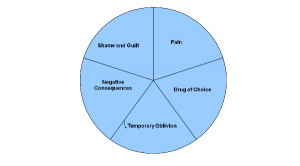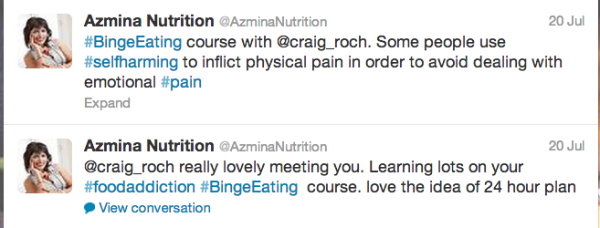I was tempted to learn more about food addiction as I believe many people are somewhere along the spectrum of some sort of distorted relationship with food. So I enrolled on this fab course and summarise my learning here for you. There was something special about Rochelle Craig’s LinkedIn profile that attracted me to her way of thinking…
“I do this work because I want to give something back to the community and to the people who are struggling with addiction. I particularly focus on compulsive overeating/food addiction because that is what I suffered from for 16 long years between the ages of 15-31. I have now had the joy and freedom of being in recovery for over 20 years and it is amazing that my recovery has been longer than when I was in my addiction”.
You really only know what someone else is going through if you’ve had some personal experience of it yourself, and Rochelle’s Piece by Piece Recovery concept encompasses her own personal life struggles as well as her years of expertise in addiction counselling. She has an MSc Addiction Counselling and has an Accredited Drug and Alcohol Counsellor by the Federation of Drug and Alcohol Professionals. So I felt I was in good hands when I enrolled for her Food Addiction & Binge Eating Disorder Course.
My 8 take-outs from the day:
- The aim is to give “Freedom from the Compulsion to eat”.
- Research has demonstrated many similarities between substance abuse and over eating.
- Binge eating can create a fear that life would not be the same without this behaviour. People who have a food addiction seem to be pre-occupied with food and this pre-occupation in a way saps the spirit out of them.
- It’s not about knowledge: people who overeat know they are potentially harming themselves. They have the classic repeated unsuccessful attempts to diet. They have a pre-occupation with food by knowing calorie values, weighing food, hiding food, etc. They may even give up social activities.
- Until you understand the cycle of addition you can’t step out of it.
- It’s important to get out of isolation, and group therapy can be more helpful than one to one sessions.
- Some people get a buzz out of the drama, out of the highs and lows. And this buzz keeps them where they are.
- One day at a time – I really liked this concept.
Want to know more? Check out my tweets below from the course and visit Piece by Piece Recovery
Want to know even more? Here are some insights from the research:
“Although addictive behaviour is generally associated with drug and alcohol abuse…. Chocolate may evoke similar psychopharmacologic and behavioural reactions in susceptible persons” – Bruinsma K., Taren D.L., (1999), University of Arixona, College of Medicine
“Eating has features of automatic behaviour… the results bear important implications for the research and practice concerning eating behaviour, especially obesity” – Moldovan A. R., David D., Features of Automaticity in Eating Behaviour. Eating Behaviours 13 (2012) 46-48
“One of the most compelling similarities between food and drug addiction is the experience of craving which is often accompanied by a loss of control and subsequent ingestion of the craved substance or food.” – Meule A., Kubler A., Food cravings in food addiction: The distinct role of positive reinforcement. Eating Behaviours (2012)
“… morbidly obese patients reported more food craving…” – Abiles et al (2010) Psychological characteristics of morbidly obese candidates for bariatric surgery. Obesity Surgery, 20, 161-167





